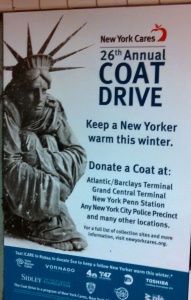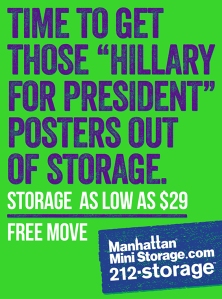Dear reader,
First Things provides a place where faith has a voice. Will you make sure that voice is heard by helping us reach our goal of raising $400,000 by the end of the year?
Your gift will help underwrite the cost of publishing First Things, maintain firstthings.com, and fund our other work, including the Junior Fellows Program, symposia, evening lectures, and public events. We cannot do these things without the continued generosity of our readers.
Will you help us by contributing today?
Sincerely,
R. R. Reno
Editor
Here’s a follow up to last week’s post about disclaimers on “viewpoint” ads in the New York City subway. In the post, I complained about the unfair treatment the policy affords to ads with religious messages, like the one I described from Marble Collegiate Church.
As Perry Dane explains, though, the disclaimer policy is not directed at religion per se. It applies generally to noncommercial ads that express viewpoints on “political, religious, or moral issues or related matters.” The Metropolitan Transit Authority adopted the policy after losing a 2012 lawsuit over display of anti-Islam ads. A federal district court ruled that, because the subway is a public forum, the MTA could not constitutionally refuse to display the ads. So the MTA decided to add the disclaimer to them and all other “viewpoint” ads, in order to avoid any implication of government endorsement. (The sponsor of the 2012 ads, the American Freedom Defense Initiative, is currently suing the MTA over display of a new anti-Islam ad, which the MTA refuses to display even with the disclaimer, on the ground that the ad may incite violence.)
Still, whatever the formal policy, the MTA appears to apply it in a rather arbitrary way. I did a little research over the weekend. From what I could find, the policy has been applied to the AFDI ads; an ad for a Spanish-language Catholic television station; an ad from the Brooklyn Diocese featuring Pope Francis; and the Marble Collegiate ad I wrote about last week. All religious. What about disclaimers on ads that express viewpoints on political, moral, and related matters? Perhaps there are examples,  but I couldn’t find any. More importantly, in no time at all I found three such ads without disclaimers.
but I couldn’t find any. More importantly, in no time at all I found three such ads without disclaimers.
First, there’s this ad for New York Cares, a volunteer organization that runs an annual coat drive. The ad clearly expresses a moral viewpoint, namely, that many New Yorkers go without winter coats, and the community has a moral obligation to respond. In fact, the ad’s use of the Statue of Liberty, a symbol of America and the refuge it has provided for the world’s “huddled masses,” adds a political dimension. How can we tolerate such poverty in this great republic of ours? To be sure, these messages are non-verbal, but that’s what makes them so powerful. There’s no MTA disclaimer.
 Or take this ad for Airbnb, a website that helps people rent space in their apartments to strangers for short stays. This ad campaign, which features New Yorkers saying how great Airbnb is for the city,has a political message as well,though you might not spot it if you’re not from New York. The company is trying to get the state legislature to loosen a law that restricts the use of private apartments as hotels. The ads are an obvious attempt to win public support for that effort. Still, notwithstanding the ad’s political implications, there’s no MTA disclaimer.
Or take this ad for Airbnb, a website that helps people rent space in their apartments to strangers for short stays. This ad campaign, which features New Yorkers saying how great Airbnb is for the city,has a political message as well,though you might not spot it if you’re not from New York. The company is trying to get the state legislature to loosen a law that restricts the use of private apartments as hotels. The ads are an obvious attempt to win public support for that effort. Still, notwithstanding the ad’s political implications, there’s no MTA disclaimer.
 Finally, here’s the latest ad campaign for Manhattan Mini Storage. The company is famous for ironic, edgy ads that appeal, I guess, to sophisticated New York subway riders. Here, the political message seems pretty clear. True, this might be just another ironic ad (“Can you believe she’s running again?”) but I don’t think so, given the partisan messages in the company’s past ad campaigns, like ones poking fun at Michelle Bachmann and advocating gay marriage. Yet, again, no MTA disclaimer.
Finally, here’s the latest ad campaign for Manhattan Mini Storage. The company is famous for ironic, edgy ads that appeal, I guess, to sophisticated New York subway riders. Here, the political message seems pretty clear. True, this might be just another ironic ad (“Can you believe she’s running again?”) but I don’t think so, given the partisan messages in the company’s past ad campaigns, like ones poking fun at Michelle Bachmann and advocating gay marriage. Yet, again, no MTA disclaimer.
Now, the MTA would presumably defend its choice not to put disclaimers on the Airbnb and Manhattan Mini Storage ads because the policy formally applies only to noncommercial ads. But that seems arbitrary. As Marc DeGirolami points out, it’s very difficult to disentangle “commercial” from “noncommercial” expression. To my mind, the Hillary ad is the most obviously political, even though its sponsors are only trying to make money. Besides, the New York Cares ad is surely noncommercial—it’s for a volunteer organization.
As I say, perhaps the MTA has put disclaimers on non-religious viewpoint ads and I simply haven’t found them. It’s significant, though, that it’s so easy to find the disclaimer on religious viewpoint ads, and so easy to find political and moral viewpoint ads without the disclaimer. Here’s a thought: Perhaps the MTA should stop trying to distinguish among ads and put disclaimers on all of them—commercial, noncommercial, political, moral, and religious. That would solve the appearance-of-endorsement problem, if the problem genuinely exists, and free up MTA resources for doing something important: running the subway.
Mark Movsesian is the Frederick A. Whitney Professor of Contract Law and the Director of the Center for Law and Religion at St. John’s University School of Law. His previous blog posts can be found here.
